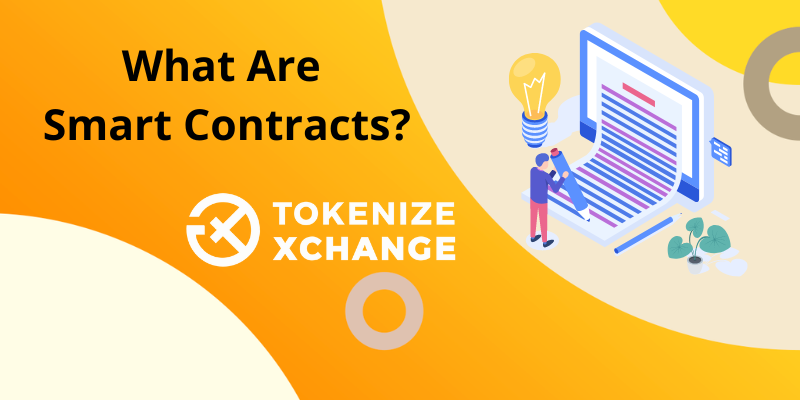
The term was coined back in 1998 by an American scientist named Nick Szabo. The idea was to use computer code to execute terms of sophisticated contracts for buying and selling securities such as options and futures. The aim is to provide security that is superior to traditional contract law and to reduce other transaction costs associated with contracting.

Smart contracts are self-executing contracts. They are stored on a blockchain and run when the necessary conditions are met. They allow developers to build decentralized apps that can be used in every field and are appreciated because their ‘rules’ are absolute.
Once a smart contract is added to a blockchain, it normally cannot be reversed or changed. This helps ensure that it won’t be shut down or tweaked for any malicious purpose or intent by other third parties
Advantages of smart contracts
What smart contracts provide are speed, efficiency, transparency, and security. This is especially true for transactions as smart contracts do not release payments until both parties have agreed to it. Doing this prevents fraud, mistakes, and outside intervention in the transaction. On top of it all, the contract is immediately executed once the conditions are met and save both time and energy.
Smart contracts can be used in a variety of fields, from healthcare to supply chains to financial services. Some examples are as follows:
- Healthcare
Currently, the world‘s healthcare computer systems hold hundreds of millions of patient medical records. Despite the fact that these healthcare organizations have invested huge sums of money in security, current access and storage methods are far more vulnerable to cyber-attacks and tampering than their blockchain-based equivalents are.
Blockchain technology could allow entire databases of personal health records to be securely encrypted and kept. An added bonus is that the technology also facilitates the use of a private key which means only certain authorized individuals can gain access.
Some of the other blockchain smart contract use cases include their use in issuing prescriptions, storing receipts, general stock management, storing test results, and so on.
It also removes human errors from the equation, such as issues over the prescribed amount of prescriptions or the wrong treatment for patients.
- Property ownership
Smart contracts have two huge uses when it comes to the property market. Firstly, they can be used to record property ownership. Since the use of smart contracts is faster and more cost-efficient this makes them a much better alternative to existing systems.
It also means that they can be used to record the ownership of all types of property from buildings, and land to phones and watches.
Within the housing market, smart contracts can remove the need for expensive services provided by lawyers and housing brokers. This new technology also means that for the first time ever, sellers have the ability to handle the transaction completely by themselves.
- Voting
Allegations of voting fraud occurred as recently as the last U.S presidential elections. Despite using computer systems that, in some cases, cost millions of dollars, fraudsters find increasingly imaginative ways to manipulate them.
Smart contracts are a simple and cost-effective solution to this problem. They can be used to validate a voter‘s identity and record their vote.
This information could then be used to initiate an action after all voting has ceased. Since the blocks within a blockchain are impossible to alter once they have been recorded, manipulation of this record would not be possible.
- Product development
Another exciting use of smart contracts is to keep a ledger regarding the stages of development of a product. Two parties would sign the contract which then activates it.
As the agreed-upon project is being developed, the stages and any other relevant information is recorded in the smart contract. If the parties agrees to such things as split payments, then as these milestones are reached, the contract would initiate their release.
A huge part of the appeal of smart contracts is their ability to keep information secure and to prove its origins. A company that has invested huge amounts of money into developing a project obviously doesn‘t wish for the information to be stolen or tampered with.
Generally, the only route to justice when information is stolen is a lengthy court process, something which most companies don‘t have the time and money to go through. When it comes to intellectual property such as ideas, you only need to look as far as the never-ending patent claims between Apple and Samsung to see just how important being able to prove ownership really can be.
The list of industries that could benefit from this new technology is huge. Given that smart contracts support and secure product development, the kind of industries involved could range from small startups to large tech companies.
The whole concept of smart contract applications will unquestionably revolutionize the way we live our lives and will be around long after. A wonderful by-product to this is that they actually have the potential to make our world more democratic too. As smart contracts continue to see development and innovations, their applications in the real world will only increase. You can be a part of this innovation by investing in its underlying blockchain technology through the purchase of cryptocurrency tokens. Check out our Tokenize mobile app/website to trade Securities Commission-approved cryptocurrency tokens such as Bitcoin, Ethereum and many more.